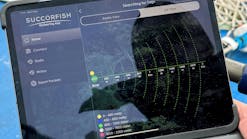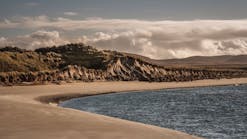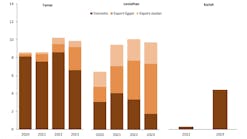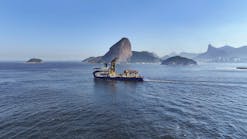Consolidated Oil's tough luck in OPL 458
Pride International's Pride Africa is participating in West Africa's deepwater drilling success with a long-term commitment off Angola.
Four months after suspending Temi-1ST with marginal oil pay, Consolidated Oil has plugged and abandoned Misty-B1X as a dry well on the same lease - OPL 458. It's tough luck for a small independent. Consolidated Oil was awarded the lease in September 1991, 14 years after Japan Petroleum relinquished it.
Various companies have drilled a total of 10 wells in the 1,560 sq km, NW-SE trending block, which lies in 50-200 meters water depth in the Western Niger Delta. There is clearly an existing oil field, Amatu, which Consolidated Oil could have gone ahead to produce, but by drilling two wildcats, the company has indicated that it is interested in newer plays. So far, however, the strategy has not worked.
Statoil slows after 218
Statoil plans to go into a six-month drilling recess after it completes drilling of Bilah-1 in OPL 218, deep offshore Niger Delta, off Nigeria. Bilah-1 is being drilled back-to-back with Ekoli-1 (OPL 217), which was suspended in late September. "We want to take a look at what we have," said a company source. Ekoli-1 was drilled to test whether the huge Agbami oil pool, in the adjacent Famfa/Texaco-held lease OPL 216, extends to Statoil's OPL 217.
The results turned out better than expected; the reserves estimates increased after the preliminary evaluation of the well (Ekoli-1). The company will integrate the results of the successful Ekoli-1 into the overall geological and engineering studies for Agbami. Company sources also say that there will be a lot of evaluation of the Bilah structure, regardless of how the current drilling turns out. Statoil moved the drillship Deepwater Millenium to the Bilah-1 location October 4, immediately after Ekoli-1. The location is N 03 20 36.4 - E 06 03 21.3, in a water depth of 1,380 meters. The proposed total depth is 4,804 meters.
Tchatamba field boosts Energy Africa's profits
Tchatamba Marin and Tchatamba South fields in offshore Gabon moved up in status to rank as the major contributors to Energy Africa's cash flow in the last six months. In a report dated November 2, the company reported a significant increase in earnings in the six months ending September 2000. Net production averaged 15,390 b/d at an operating cost of $3.92/bbl. The report indicates that the Tchatamba Marin and Tchatamba South fields have collectively upstaged the Nkossa Field in Congo Brazzaville as the main cash cow for the South African independent.
Average gross production increased from 28,100 b/d last March to 35,000 b/d of oil in the two Gabon offshore fields where Energy Africa (EA) has net interest of 9.38%. This effectively increased EA's net take in the fields, from 2,636 b/d to 3,283 b/d. Meanwhile, EA's net production from the Nkossa field in Congo Brazzaville dropped to 2,625 b/d (at 4% interest) as gross production decreased slightly to 65,630 b/d of oil, condensate, and LPG from 67,900 b/d, last March.
Tchatamba West (a satellite field to Tchatamba Marin and Tchatamba South) began production in November 2000, explained John Bentley, EA's CEO. "This well, together with an additional well in Tchatamba South, will raise production to in excess of 40,000 b/d of oil."
Elsewhere in Gabon, production from the Limande Field (EA net 7.5%) also improved on the previous period, and production from the Moukouti Field (EA net 15%) was in line with forecasts.
Ceiba on course to deliver by year-end
The Ceiba Field development is on course. The field began production in late November flowing at 33,000 b/d. "First oil is the goal we've all been working so hard to achieve," said Triton President and CEO James C. Musselman.
The Sendje Berge FPSO is on station in the Gulf of Guinea and is moored in about 300 ft of water 18 miles offshore. Triton's first four oil wells in Ceiba (located in block G off Equatorial Guinea) are hooked up to the FPSO for oil production. ABB Offshore Systems fabricated the initial oil and gas processing facilities of the Sendje Berge, which will provide onboard processing capacity of up to 60,000 b/d. Triton said it expects Ceiba production to hit a projected gross rate of 52,000 b/d. The vessel's crude oil storage capacity is 2 million bbl. Triton holds a multi-year lease for the Sendje Berge from Bergesen Offshore.
Ceiba field, discovered in October 1999, is located in 900 meters water depth, in the Rio Muni Basin offshore Equatorial Guinea. Four appraisal wells were drilled on the Ceiba field (Energy Africa 15%). The first three, Ceiba-3, Ceiba-4, and Ceiba-5, encountered thick, high-quality sands and confirmed the extent of the reservoir to the north and northwest of the original discovery.
"Ceiba-6 was a stepout to the southeast, but intersected the reservoir sands below the oil water contact," Bentley said. "In view of appraisal success, the field development plan has been revised and now anticipates a total of ten production wells and four water injection wells."
Bidding results soon in Nigeria
The Nigerian government will announce the results of the current bidding round soon. Evaluations of the bids have been concluded by the regulatory agency, the Department of Petroleum Resources (DPR). Eleven of the 22 leases on offer are in deepwater.
The government has dismissed the idea of inviting bidders to defend their bid before the government. Such a process, it is reckoned, may introduce abuse and insider information to the extent that it may tarnish the openness and transparency, which the DPR has labored to make an integral part of the evaluation process.
Whenever the bid results are announced, companies would be allowed one month from the date of announcement to honor their signature bonus obligation and enter into proper contractual agreement with the government.
Kenya reaches exploration agreement
Exploration activity could soon pick up in Kenya. According to a Kenyan government report, a contract has been signed with a UK-based company that plans to pursue both offshore and onshore exploration. The East African Standard newspaper quoted Energy Minister Francis Masakhalia, saying in parliament that the unidentified UK firm will explore two potential oil blocks in southeastern Kenya in the Kwale and Lamu districts, which border on the Indian Ocean. No ann-ouncement has been made regarding when activities will start. ;




